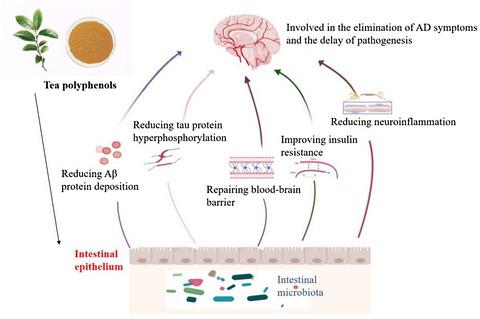当前位置:
X-MOL 学术
›
J. Food Biochem.
›
论文详情
Our official English website, www.x-mol.net, welcomes your
feedback! (Note: you will need to create a separate account there.)
Interactions of tea polyphenols with intestinal microbiota and their effects on cerebral nerves
Journal of Food Biochemistry ( IF 3.5 ) Pub Date : 2020-11-21 , DOI: 10.1111/jfbc.13575 Yuting Zhang 1 , Lu Cheng 2 , Xin Zhang 1
Journal of Food Biochemistry ( IF 3.5 ) Pub Date : 2020-11-21 , DOI: 10.1111/jfbc.13575 Yuting Zhang 1 , Lu Cheng 2 , Xin Zhang 1
Affiliation

|
Tea polyphenols (TP) are important functional components in tea. TP can regulate the composition of human intestinal flora, meanwhile, TP can be bio‐transformed by the intestinal microbiota, resulting in relative metabolites, which prevent nerve damage, promote neurocognition, and increase resistance to oxidative stress. In recent years, cerebral nerves have become a hot topic of research, and studies have marked the importance of microbial flora and TP in protecting cerebral nerves. This paper reviews the effects of TP on intestinal microflora and the microbial degradation of TP. Furthermore, the potential effects of TP on cerebral nerves have been highlighted.
中文翻译:

茶多酚与肠道菌群的相互作用及其对脑神经的影响
茶多酚(TP)是茶中重要的功能成分。TP可以调节人类肠道菌群的组成,同时TP可以被肠道菌群生物转化,产生相对的代谢产物,从而防止神经损伤,促进神经认知并增加对氧化应激的抵抗力。近年来,脑神经已成为研究的热点,研究表明微生物菌群和TP在保护脑神经方面的重要性。本文综述了TP对肠道菌群的影响以及TP的微生物降解。此外,已经强调了TP对脑神经的潜在作用。
更新日期:2021-01-19
中文翻译:

茶多酚与肠道菌群的相互作用及其对脑神经的影响
茶多酚(TP)是茶中重要的功能成分。TP可以调节人类肠道菌群的组成,同时TP可以被肠道菌群生物转化,产生相对的代谢产物,从而防止神经损伤,促进神经认知并增加对氧化应激的抵抗力。近年来,脑神经已成为研究的热点,研究表明微生物菌群和TP在保护脑神经方面的重要性。本文综述了TP对肠道菌群的影响以及TP的微生物降解。此外,已经强调了TP对脑神经的潜在作用。











































 京公网安备 11010802027423号
京公网安备 11010802027423号